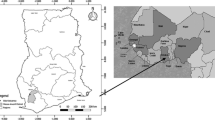Abstract
The theory of planned behaviour was applied to study the attitude and intention of households towards participating in collective forest management (tree planting) activity. Households were randomly selected from 22 forest user groups. The results indicate that the success of planting activities in terms of survival rate of seedlings has a strong effect in motivating households to participate in planting. Although households in general show a positive attitude and intention to participate in tree planting, there were significant differences among households on the basis of socio-economic characteristics. Dependence on crop income, possession of bigger farmlands and better physical assets, and higher education level are positively related to intention to participate in planting activity. On the other hand, dependence on forest income is negatively related to attitude and intention. A continuous exchange of ideas and information between user groups and the government counterparts that provide technical support and advice is recommended.


Similar content being viewed by others
References
Ajzen I (1991) The theory of planned behavior. Organ Behav Hum Decis Process 50:179–211
Ajzen I (2001) Nature and operation of attitudes. Annu Rev Psychol 52:27–58
Ajzen I (2002) Constructing a TpB questionnaire: conceptual and methodological considerations. http://people.umass.edu/aizen/pdf/tpb.measurement.pdf
Ajzen I (2005) Attitudes, personality and behaviour. McGraw-Hill Education
Ajzen I, Fishbein M (1977) Attitude-behavior relations—Theoretical-analysis and review of empirical-research. Psychol Bull 84:888–918
Ambastha K, Hussain SA, Badola R (2007) Resource dependence and attitudes of local people toward conservation of Kabartal wetland: a case study from the Indo-Gangetic plains. Wetlands Ecol Manage 15:287–302
Armitage CJ, Conner M (2001) Efficacy of the theory of planned behavior: a meta-analytic review. British J Soc Psychol 40:471–499
Badola R (1998) Attitudes of local people towards conservation and alternatives to forest resources: a case study from the lower Himalayas. Biodivers Conserv 7:1245–1259
Beedell J, Rehman T (2000) Using social-psychology models to understand farmers’ conservation behaviour. J Rural Stud 16:117–127
Borrini-Feyerabend GM, Pimbert M, Farvar MT, Kothari A, Renard Y (2004) Sharing power: learning by doing in co-management of natural resources throughout the world. IIED and IUCN/CEESP/CMWG, Cenesta, Tehran
Carter J, Gronow J (2005) Recent experience in collaborative forest management. CIFOR occasional Paper 43. CIFOR, Bogor, Indonesia
Conner M, Armitage CJ (1998) Extending the theory of planned behavior: a review and avenues for further research. J Appl Soc Psychol 28:1429–1464
EPA (1997) Environmental Policy, Federal Democratic Republic of Ethiopia. Environmental Protection Authority. Addis Abeba, Ethiopia
EPA (2003) State of environment report for Ethiopia. Federal Democratic Republic of Ethiopia. Environmental Protection Authority. Addis Abeba, Ethiopia
GFA (1991) Integrated forestry management project. Dodola–Adaba. Feasibility study final report. GTZ, Hamburg
Gelcich S, Edwards-Jones G, Kaiser MJ (2005) Importance of attitudinal differences among artisanal fishers toward co-management and conservation of marine resources. Conserv Biol 19:865–875
Gillingham S, Lee PC (1999) The impact of wildlife-related benefits on the conservation attitudes of local people around the Selous Game Reserve, Tanzania. Environ Conserv 26:218–228
Husain Z, Bhattacharya RN (2004) Attitudes and institutions: contrasting experiences of Joint Forest Management in India. Environ Dev Econ 9:563–577
IFMP (1999) Project Synopsis. Integrated Forest Management Project. Adaba-Dodola (unpublished)
Infield M, Namara A (2001) Community attitudes and behaviour towards conservation: an assessment of a community conservation programme around Lake Mburo National Park, Uganda. Oryx 35:48–60
JICA (2006) Outline of the project. In: Japan International Cooperation Agency. http://www.jica.go.jp/project/ethiopia/0604584/english/01/index.html. Accessed 13 Feb 2010
Karppinen H (2005) Forest owners’ choice of reforestation method: an application of the theory of planned behavior. Forest Policy Econ 7:393–409
Kassa H, Campbell B, Sandewall M, Kebede M, Tesfaye Y, Dessie G, Seifu A, Tadesse M, Garedew E, Sandewall K (2009) Building future scenarios and uncovering persisting challenges of participatory forest management in Chilimo Forest, Central Ethiopia. J Environ Manag 90:1004–1013
Keeley J, Scoones I (2000) Knowledge, power and politics: the environmental policy-making process in Ethiopia. J Mod Afr Stud 38:89–120
Kideghesho JR, Roskaft E, Kaltenborn BP (2007) Factors influencing conservation attitudes of local people in Western Serengeti, Tanzania. Biodivers Conserv 16:2213–2230
Kubsa A (1998) The proceedings of a forest conservation workshop held in Finfine. IFMP, Adaba-Dodola
Kubsa A, Tadesse T (2002) Granting exclusive user rights to the forest dwellers in the state owned forest: The WAJIB approach in Ethiopia. In: Second international workshop on participatory forestry in Africa. FAO, Arusha Tanzania 18–22 Feb 2002
Kubsa A, Mariame A, Amante G, Lipp HJ, Tadesse T (2003) Wajib: an alternative forest conservation approach for Ethiopia’s forests. XII World Forestry Congress, Quebec
Lee TM, Sodhi NS, Prawiradilaga DM (2009) Determinants of local people’s attitude toward conservation and the consequential effects on illegal resource harvesting in the protected areas of Sulawesi (Indonesia). Enviro Conserv 36:157–170
Lepp A, Holland S (2006) A comparison of attitudes toward state-led conservation and community-based conservation in the village of Bigodi, Uganda. Soc Nat Resour 19:609–623
Lise W (2000) Factors influencing people’s participation in forest management in India. Ecol Econ 34:379–392
Matta JR, Alavalapati JRR (2006) Perceptions of collective action and its success in community based natural resource management: an empirical analysis. Forest Policy Econ 9:274–284
Mehta JN, Heinen JT (2001) Does community-based conservation shape favorable attitudes among locals? An empirical study from Nepal. Environ Manage 28:165–177
Mehta JN, Kellert SR (1998) Local attitudes toward community-based conservation policy and programmes in Nepal: a case study in the Makalu-Barun Conservation Area. Environ Conserv 25:320–333
Naik G (1997) Joint forest management—Factors influencing household participation. Econ Polit Weekly 32:3084–3089
Pancel L (1993) Tropical forestry handbook, vol 1. Springer-Verlag
PFMP (2006) The PFMP programme. In: FARM Africa. http://www.pfmp-farmsos.org/projects-intro.htm. Accessed 13 Feb 2010
Pouta E, Rekola M (2001) The theory of planned behavior in predicting willingness to pay for abatement of forest regeneration. Soc Nat Resour 14:93–106
Primmer E, Karppinen H (2010) Professional judgment in non-industrial private forestry: forester attitudes and social norms influencing biodiversity conservation. Forest Policy Econ 12:136–146
Richardson EA, Kaiser MJ, Edwards-Jones G (2005) Variation in fishers’ attitudes within an inshore fishery: implications for management. Environ Conserv 32:213–225
Rishi P (2007) Joint forest management in India: an attitudinal analysis of stakeholders. Resour Conserv Recycling 51:345–354
Shackleton S, Campbell B, Wollenberg E, Edmunds D (2002) Devolution and community-based natural resource management: creating space for local people to participate and benefit? In: Devolution and community-based natural resource management: creating space for local people to participate and benefit? Overseas Development Institute, p 6
Shibia MG (2010) Determinants of Attitudes and perceptions on resource use and management of Marsabit National Reserve, Kenya. J Hum Ecol 30:55–62
Shrestha RK, Alavalapati JRR (2006) Linking conservation and development: an analysis of local people’s attitude towards Koshi Tappu Wildlife Reserve, Nepal. Environ Dev Sustain 8:69–84
Struhsaker TT, Struhsaker PJ, Siex KS (2005) Conserving Africa’s rain forests: problems in protected areas and possible solutions. Biol Conserv 123:45–54
Sunderlin W, Hatcher J, Liddle M (2008) From exclusion to ownership? Challenges and opportunities in advancing forest tenure reform. The Rights and Resources Initiative, Washington DC
Tessema ME, Lilieholm RJ, Ashenafi ZT, Leader-Williams N (2010) Community attitudes toward wildlife and protected areas in Ethiopia. Soc Nat Resour 23:489–506
Tomicevic J, Shannon MA, Milovanovic M (2010) Socio-economic impacts on the attitudes towards conservation of natural resources: case study from Serbia. Forest Policy Econ 12:157–162
Trafimow D, Sheeran P, Conner M, Finlay AK (2002) Evidence that perceived behavioral control is a multidimensional construct: perceived control and perceived difficulty. British J Psychol 41:101–121
Unkovsky S (1998) Model calculation of minimum forest area per household for forest-dwellers in the forest priority area of Adaba-Dodola. IFMP, Adaba-Dodola
Van Gossum P, Luyssaert S, Serbruyns I, Mortier F (2005) Forest groups as support to private forest owners in developing close-to-nature management. Forest Policy Econ 7:589–601
White A, Martin A (2002) Who owns the world’s forests? Forest tenure and public forests in transition. Earthscan/James & James, London, p 72
Zubair M, Garforth C (2006) Farm level tree planting in Pakistan: the role of farmers’ perceptions and attitudes. Agrofor Syst 66:217–229
Author information
Authors and Affiliations
Corresponding author
Rights and permissions
About this article
Cite this article
Tesfaye, Y., Roos, A. & Bohlin, F. Attitudes of local people towards collective action for forest management: the case of participatory forest management in Dodola area in the Bale Mountains, Southern Ethiopia. Biodivers Conserv 21, 245–265 (2012). https://doi.org/10.1007/s10531-011-0181-2
Received:
Accepted:
Published:
Issue Date:
DOI: https://doi.org/10.1007/s10531-011-0181-2




